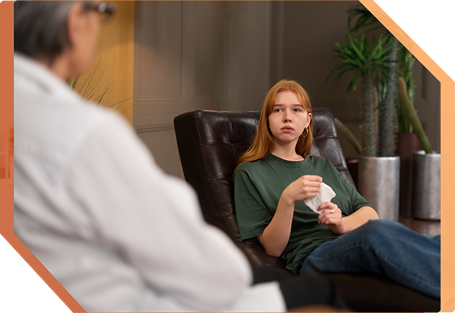Disinhibited Social Engagement Disorder (DSED) Treatment in Nevada
Unfortunately, for some, boundary-crossing and impulsivity turn into lasting challenges, which indicates the presence of disinhibited social engagement disorder that must be taken seriously.
What Is Disinhibited Social Engagement Disorder?

Disinhibited Social Engagement Disorder Symptoms
Excessive Familiarity
Lack of Boundaries
Impulsive Behavior
Hyperactivity
Lack of Social Awareness
Inability to Connect on a Deeper Level

Excessive Familiarity

Lack of Boundaries

Impulsive Behavior

Hyperactivity

Lack of Social Awareness

Inability to Connect on a Deeper Level
How to Diagnose Disinhibited Social Engagement Disorder?
Rule out other conditions that may have similar symptoms such as reactive attachment disorder (RAD), and continue to monitor the person to figure out whether they have any underlying mental health problems.
Rule out other conditions that may have similar symptoms such as reactive attachment disorder (RAD), and continue to monitor the person to figure out whether they have any underlying mental health problems.
What Does Sleep Disorder Treatment Involve?
Trauma-Focused Care
In individual therapy, you will have an opportunity to explore your traumatic
experiences, process the memories that continue to make your life harder, and analyze the impact of your past on your present and future.
Cognitive Behavioral Therapy (CBT)
A therapist will help you identify negative thinking patterns that hold you back and
replace them with positive ideas and notions so that you are able to set appropriate boundaries and interact with others without jeopardizing your safety.
Dialectical Behavior Therapy (DBT)
This therapy modality is a smart solution for many patients because it will teach you how to
Trauma-Focused Care
In individual therapy, you will have an opportunity to explore your traumatic
Cognitive Behavioral Therapy (CBT)
A therapist will help you identify negative thinking patterns that hold you back and
Dialectical Behavior Therapy (DBT)
This therapy modality is a smart solution for many patients because it will teach you how to
While every patient’s story is different, disinhibited social engagement disorder usually stems from early childhood – if the person was abused, neglected, or raised by different caregivers, this may lead to the development of this condition. There are people who went through severe adverse situations early in life, whether they were in foster care or were exposed to violence, which also resulted in the manifestations of this disorder that may last into adolescence and adulthood.
In most instances, there is no specific recovery timeline for patients with disinhibited social engagement disorder – it is a long-term process that requires multiple therapeutic approaches as well as ongoing support from the person’s family and friends. As for the residential treatment, it may last for a few months depending on the severity and longevity of the condition and the way the patient responds to treatment – if the person is allowed to spend time in a secure and stable environment with no external triggers bothering them, it is possible to manage symptoms successfully within one or two months.
Parents of children with disinhibited social engagement disorder are advised to act as soon as their kids show willingness to speak or leave with unfamiliar adults. If you are an adult and you exhibit the symptoms of this condition, do not delay treatment even though you may feel like your health and safety are not in danger – do not allow further health complications to derail your life and interfere with your daily functioning. When you feel like you experience emotional distress or relationship difficulties due to emotions and behaviors you cannot control, speak to a mental health professional.
In most instances, there is no specific recovery timeline for patients with disinhibited social engagement disorder – it is a long-term process that requires multiple therapeutic approaches as well as ongoing support from the person’s family and friends. As for the residential treatment, it may last for a few months depending on the severity and longevity of the condition and the way the patient responds to treatment – if the person is allowed to spend time in a secure and stable environment with no external triggers bothering them, it is possible to manage symptoms successfully within one or two months.

Why Choose Red Rock Behavioral Health for Disinhibited Social Engagement Disorder Treatment?
Privacy and Accessibility
You will be able to try diverse therapy modalities either in outpatient or inpatient care. Moreover, our facility will guarantee your confidentiality to make sure you feel safe enough to open up about your deep-seated emotional issues.
Patient-Centered Care
The patient’s interests and needs are our number one priority - we will come up with a treatment program that takes your preferences into account and modify the strategy in case it is ever required.
Proven Expertise
Our team of dedicated professionals is not afraid of a challenge - we will implement therapeutic approaches like psychodynamic therapy and acceptance & commitment therapy (ACT) to guide you to wellness.
Nurturing Environment
With the assistance of holistic practices, you will be able to reduce the level of stress and anxiety - undergo meditation therapy or art therapy that will make you more emotionally resilient.
Privacy and Accessibility
You will be able to try diverse therapy modalities either in outpatient or inpatient care. Moreover, our facility will guarantee your confidentiality to make sure you feel safe enough to open up about your deep-seated emotional issues.
Patient-Centered Care
The patient’s interests and needs are our number one priority - we will come up with a treatment program that takes your preferences into account and modify the strategy in case it is ever required.
Proven Expertise
Our team of dedicated professionals is not afraid of a challenge - we will implement therapeutic approaches like psychodynamic therapy and acceptance & commitment therapy (ACT) to guide you to wellness.
Nurturing Environment
With the assistance of holistic practices, you will be able to reduce the level of stress and anxiety - undergo meditation therapy or art therapy that will make you more emotionally resilient.
DSED Treatment Near Me
DSED FAQs
Disinhibited social engagement disorder (DSED) is a subtype of attachment disorder that compels the individual to demonstrate a lack of wariness and inhibition around people they do not know.
We accept most insurance plans to accommodate our clients – you can find more information on our Insurance Verification page.
DSED treatment yields better results when several therapy modalities are combined – family therapy, cognitive and behavioral strategies, and trauma-sensitive care will help the person recover.
To confirm a young person has DSED, it is necessary to evaluate their mental health as well as interview their parents or caregivers who can provide crucial information about the causes of the patient’s behavior and the patterns a therapist may miss. If there are additional mental health problems, they must be treated alongside DSED – see what our clinic can help you with on our What We Treat page.
Yes, DSED may impact the person’s life long after childhood and adolescence are over – they may recover in outpatient or residential care based on the severity of their condition. Learn more about the treatment options our facility offers on our Levels of Care page.
How to Start DSED Treatment in Nevada?
Whether you have lived with disinhibited social engagement disorder or, for some reason, this condition was diagnosed only recently, it should not prevent you from seeking the mental health support required to live a fulfilling social life. Our specialists will map out a disinhibited social engagement disorder treatment plan and guide you towards wellness.
Reach out to Red Rock Behavioral Health now – call (949) 704-6793 or visit our contact page to sign up for the therapy you need.
recently, it should not prevent you from seeking the mental health support required to live a fulfilling social life. Our specialists will map out a disinhibited social engagement disorder treatment plan and guide you towards wellness.
Reach out to Red Rock Behavioral Health now – call (949) 704-6793 or visit our contact page to sign up for the therapy you need.
- (949) 704-6793
- contact@redrockbehavioral.com
- Red Rock Canyon | Las Vegas, Nevada
